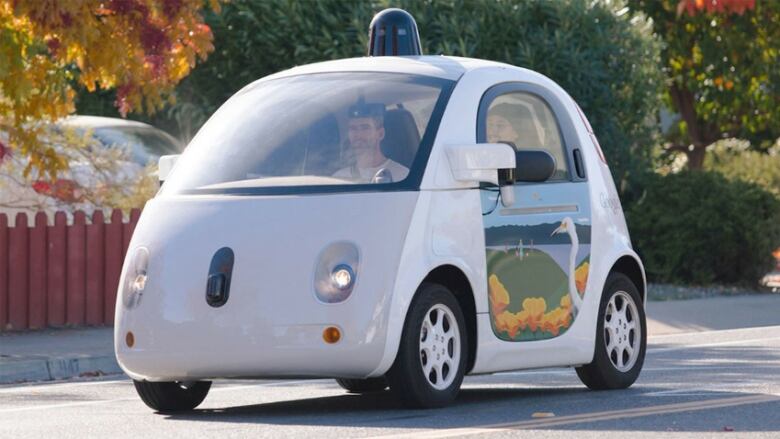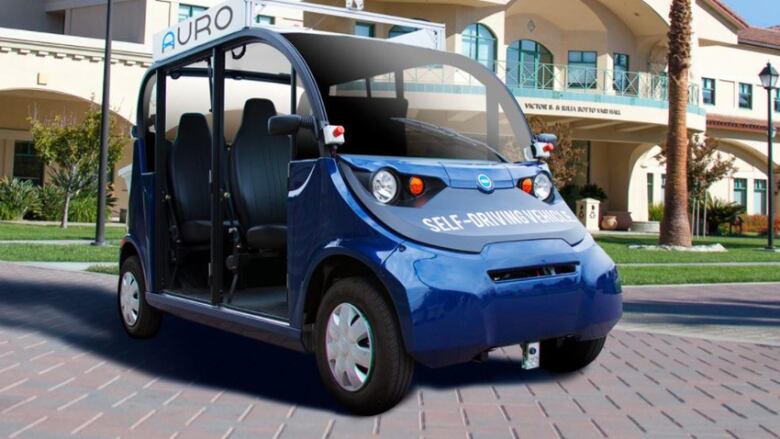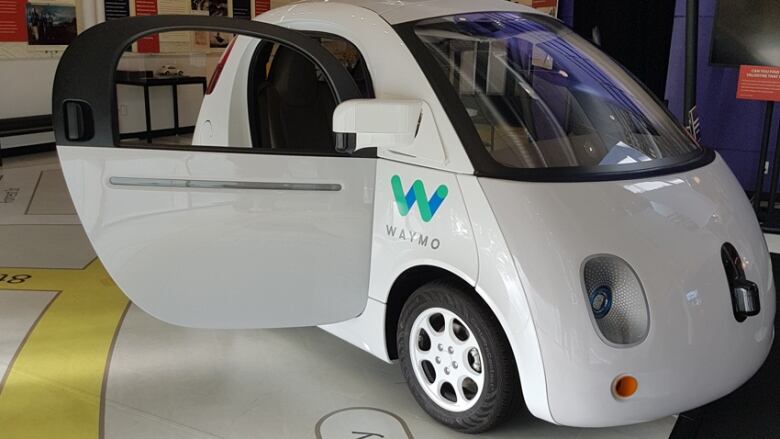Autonomy: The unexpected implications of self-driving vehicles

We're racing down the highway to autonomous cars, whether it takes 10, 20 or 30 years. But what happens to our economy, the shape of our cities, and even our century-old car-centric culture once the vehicles arrive? Contributing producer Sean Prpick steers through the excitement, opportunities, roadblocks, and unmarked curves as we are driven into the future by a technology that may understand us better than we understand it. **This episode originally aired September 12, 2017.
More than a century ago, the automotive revolution struck the world like an infinitely powerful thunderbolt. Nothing in a series of technological revolutions not TV, the Internet, the airplane not anything at all, really, has had the power that cars and trucks have had in literally re-shaping our landscape, economy, environment, or even our own personal destinies.
Now, we are on the threshold of a second automotive revolution at least as consequential as the first, possibly more so. And the revolution, as Sean Prpick learned, will be autonomous as our cars and trucks are given minds of their own. They will drive us everywhere and even, when circumstances demand it, make life and death decisions on our behalf.




Guests in this episode:
- Eric Webber is an engineer with Auro Robotics of Santa Clara, CA. Eric was Sean Prpick's guide to the Auro Shuttle, a sophisticated autonomous people mover that transports staff and students around the campus of Santa Clara University.
- Sebastian Thrun is President of Udacity Co.Thrun is known as the Godfather of the Self-Driving Car for his pioneering work overseeing the design of the first autonomous vehicles, which were developed during his time at Google. Now, Udacity, his online education company, is training the next generation of self-drivingcar engineers and technologists.
- Joseph Heath is a University of Toronto philosopher who take a special interest in cars and traffic. Heath says the human-driven cars of today, which, in big cities at least, are usually stuck in traffic, are a significant cause of anhedonia, or the inability to feel pleasure. He looks forward to the day when driving will done with the utmost safety and convenience by artificial intelligence, not us.
- Tony Sebais a lecturer in Entrepreneurship, Disruption and Clear Energy at Stanford University's Continuing Studies Program. Seba is an influential futurist who has received a lot of attention as the cost of solar energy technology plummets and vastly increases in sophistication -- exactly what he predicted 10 years ago. Now, he's predicting an equally revolutionary disruption in the car and oil business a decade from now as vehicles become autonomous, electric and much cheaper to use.
- Sven Beikeris apioneering engineer in self-driving technology (who once worked with Sebastian Thrun) and a leading consultant to corporations trying to prepare for the looming autonomous vehicle era. He's a lecturer at the Stanford University Graduate School of Business and founder and Managing Director at Silicon Valley Mobility, LLC. Beiker's slogan when speaking about the topic is, "Autonomous driving: sooner than you think, but different than you might expect."
- Jennifer Keesmaatis an urban planner and was Chief Planner for the City of Toronto between 2012 and 2017. Keesmaat says the impact of the car on cities over the last century can't be underestimated and that the next of autonomous vehicles will be at least as influential in shaping the urban environment, if not more so. She says self driving presents many challenges for planners and the communities they serve, but terrific opportunities to make a better world, too.
- Gary Hsuehwas, until the fall of 2017,a Senior Transportation Planner in the San Francisco office of Arup, a company that provides engineering, design, planning, project management and consulting services for all aspects of the built environment. Hsueh says lack of planning and preparation for autonomous vehicles could lead us to a kind of "transportation hell" with more gridlock, more pollution and more uncontrolled urban sprawl. But with planning -- and luck -- he says an alternative "transportation heaven" is also possible that includes a blend of private and public autonomous transportation operating within a more livable urban environment.
- Zeynep Tufekciis an American author, academic, and self-described "techno-sociologist" who primarily writes about the effect of technology on politics and society. Tufekci, who teaches at the University of North Carolina Chapel Hill, has serious concerns about the millions who'll be thrown out of work when self driving takes over their transport trucks, taxis and Uber-style cars. Will they become a source of major social, even military unrest, she asks?
- David Booth is one of the luckiest journalists in Canada, who gets to drive bespoke half-million dollar Ferraris and the world's fastest motorcycles for a living. This columnist with Postmedia is also a trained engineer and close follower of the latest developments in autonomous driving. Booth has some serious concerns about what is to come. For example, who's responsible for the insurance claim in a future road accident? The person in the car? Or the computer driving it? And will our civil liberties be at stake if we surrender more and more control to our own automobiles?
- Jean-Francois Bonnefonis the Research Director at the French Centre National de la Recherche Scientifique in Toulouse. Bonnefon's work investigates rational thinking and behavior as manifested in decision-making, reasoning, and moral preferences. That field of study has led him and his team into an extensive and international collaboration examining the need for well written software to handle ethics and decision-making in the self driving cars of the future. And that research has turned up some surprising universal values among the world's drivers, along with some paradoxical attitudes that will have to be dealt with before autonomous cars can take to the road.
Further reading:
- Reinventing the Automobile: Personal Urban Mobility for the 21st Century, by William J. Mitchell, Chris E. Borroni-Bird and Lawrence D. Burns, MIT Press, 2010.
- The Great Race: The Global Quest for the Car of the Future, by Levi Tillemann, Simon & Schuster, 2016.
- Shifting Gears: Preparing For Automated Vehicles, by Vijay Gill, Brian Flemming, Paul Godsmark, Barrie Kirk, The Conference Board of Canada, 2015.
- The Social Dilemma of Self Driving Vehicles, by J.F. Bonnefon, A. Shariff, I. Rahwan, Science Magazine, 24 Jun 2016: Vol. 352, Issue 6293, pp. 1573-1576
Related websites:
- The Moral Machine (MIT)
- Waymo
- Driver's Ed for Self-Driving Cars: How Our Deep Learning Tech Taught a Car to Drive
- Invisible City: The future of the car
- Dryve Report follows developments in autonomous vehicles
**This episode was produced by Dave Redel and Sean Prpick.












_(720p).jpg)


 OFFICIAL HD MUSIC VIDEO.jpg)
.jpg)



























































































